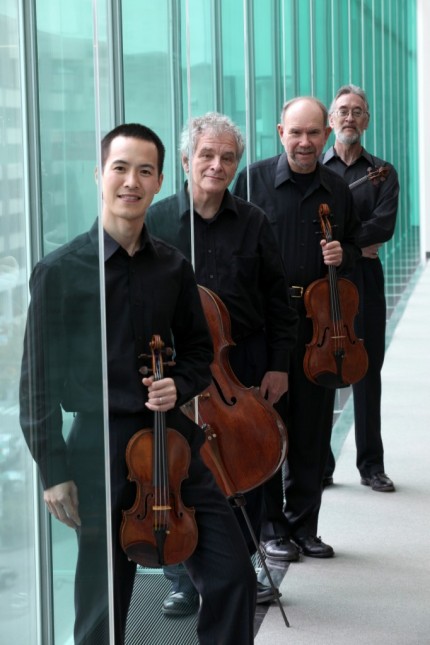After 44 years, a passing of the bow for the Juilliard Quartet at Ravinia

The Juilliard String Quartet performed Wednesday at Ravinia. From left, Joseph Lin, Joel Krosnick, Samuel Rhodes and Ronald Copes.
One would have to possess a heart of stone not to be moved by the scene on stage following the Juilliard String Quartet’s concert Wednesday night at Ravinia’s Martin Theatre.
This was Samuel Rhodes’ final appearance as violist of the celebrated chamber ensemble after a remarkable 44-year run. During the vociferous curtain calls, Rhodes couldn’t hold back the emotions and broke into tears as he hugged his longtime colleague, cellist Joel Krosnick.
Wednesday’s program amounted to a tribute to Rhodes, one of the Juilliard Quartet’s longest-reigning members, as well as a passing of the viola bow to his successor, Roger Tapping. Late works by Beethoven and Mozart framed the program with the centerpiece a composition by Rhodes himself.
The Juilliard Quartet was founded in 1946 by students at the conservatory that gave the group its name (Robert Mann, Robert Koff, Raphael Hillyer and Arthur Winograd made up the original roster). Rhodes, who joined in 1969, and Krosnick (in 1974) have long been anchors of stability in a group that has seen violinists come and go in recent decades (including Joel Smirnoff, who moved from the second fiddle chair to the first when Mann retired in 1997).
The venerable group’s fortunes have risen and ebbed from their heyday in the 1960s and 1970s and at this point in its 67-year history, the Juilliard Quartet is clearly a group in transition.
Joseph Lin, who came aboard in 2011, represents the future, and the 34-year-old first violinist contributed the finest playing of the evening with an immaculate technique, elegant tone and an easy virtuosity that was often dazzling. Hiring the immensely gifted Tapping (former violist of the Takacs Quartet) as Rhodes’ successor was an inspired choice: his warm tone and alert, responsive playing was a constant pleasure. Ronald Copes remains a stable presence in the second violin chair.
While their playing was solid and musicianly, it would be untrue to pretend that the march of time hasn’t taken its toll on both Rhodes and Krosnick. The veteran members’ tone was often thin and wiry, their techniques fallible with rough edges, and the playing sounded more than a little tired, especially with a young firebrand like Lin in the first chair.
The concert opened with Beethoven’s Quartet in F major, op. 135. Unlike the intense otherwordly mystery of most of his late quartets, the composer’s final work in the genre is light and almost Haydnesque, and the Juilliard players were in synch with the relaxed expression. Their balancing was notable in the playful skittering Vivace, and Lin’s incisive yet sweet tone skillfully sustained the long violin cantilena of the Lento, albeit with some foursquare rhythms from his colleagues. The final movement was less successful, failing to gel interpretively and coming off as disjointed, missing Beethoven’s bumptious energy.
Rhodes was represented as a composer with his String Quintet. The work dates from 1968, and was his thesis for his graduation from Princeton, written a year before Rhodes joined the Juilliard Quartet.
Rhodes’ quintet is a work of its time, with the shades of his teacher, Roger Sessions, and Elliott Carter both hovering nearby. Though well laid out for the five instruments, 1960s tropes dominate, cast in a serial style centered on dry textures, arid fragments and crunched harmonies amid the bow scraping and noises. The third and final movement is especially long and meandering in its dated, musty academicism.
Rhodes’ colleagues paid him the ultimate tribute by tackling this dry-boned relic with total conviction and intensity as if it were a masterpiece. Tapping, taking the first viola part, played with facility and subtle hues, and Lin’s bravura account of the finale’s extended solo raised the quintet, briefly, above its hoary gestures.
Not many chamber evenings close with Mozart, but his String Quintet in D major, K. 593 made a fine coda to the evening and Rhodes’ storied career. Here, Rhodes took the first viola part and Tapping the second, making this historic handoff a graceful and inspiring public event.
The performance was a worthy one, though there were some dogged moments and, for all the technical excellence of Lin’s violin work, his straight-faced playing could have used more Mozartean charm. Yet the Adagio had the right searching interior expression and the final movement went with admirable wit and energy.